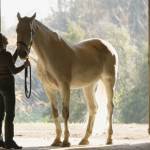Keeping Older Horses Healthy: Gastrointestinal System

No one is sure why horses seem to live longer these days than they did, say, 50 years ago. Maybe it’s due to better nutrition, changes in deworming protocols, or more effective vaccinations against disease. Possibly the change reflects more than one factor, combined with an upswing in owners’ knowledge of management techniques to avoid laminitis, colic, and debilitating lameness. In any case, horses are routinely living well into their 20s, and many of these senior equines are still enjoying performance careers at some level.
Horses that live more than two decades usually show some signs of slowing down by the time they are 23 to 25 years old. Speaking at the 2012 conference of the American Association of Equine Practitioners, Mary Rose Pardis, a veterinarian at the Cummings School of Veterinary Medicine in North Grafton, Massachusetts, explained that health problems seen in older horses are most often related to the gastrointestinal, musculoskeletal, and respiratory systems. Many of the health problems of senior equines are similar to those seen in younger horses—for example, colic—but in older horses, it may be difficult to determine whether a sign such as reduced voluntary movement is due to a specific disease or is simply related to ageing.
In one study, colic was the most common reason older horses were seen at a veterinary clinic. Another study showed that gastrointestinal problems such as ruptures, twists, and displacements were the most common reason for death in horses over the age of 15. Strangulating lipomas and impaction were also seen frequently in older horses.
Regular dental care should be scheduled for senior equines because problems with teeth are often factors in impaction and choke. Horses that drop feed, have trouble chewing, or ball up forage before swallowing or spitting it out (known as quidding) might need the services of an equine dentist. If the horse has dental problems that can’t be completely corrected, owners may need to make changes to the feed and forage that is offered. Chopping hay, using a cubed complete feed, and adding water to the concentrate to form a mash or slurry are steps that can be taken to make it easier for an older horse to eat.
Senior horses may look thinner because of a decrease in muscle mass that occurs with age. Loss of weight and body condition may or may not result from disease. A veterinarian can usually diagnose or rule out illness, and treating problems like Cushing’s disease or gastric ulcers can make a difference in the horse’s appetite and response to nutrition. Other management considerations include providing shelter (horses use a lot of energy to stay warm) and allowing the older horse to eat in a separate area instead of having to compete with other horses for pasture-fed hay or concentrate.
Healthy older horses that are losing weight might benefit from dietary changes like eating higher-quality forage, getting an extra daily grain ration, having fat added to the concentrate meals, and including a super fiber such as beet pulp or soy hulls in the diet. Any changes to the feeding program should be made gradually over several days.








